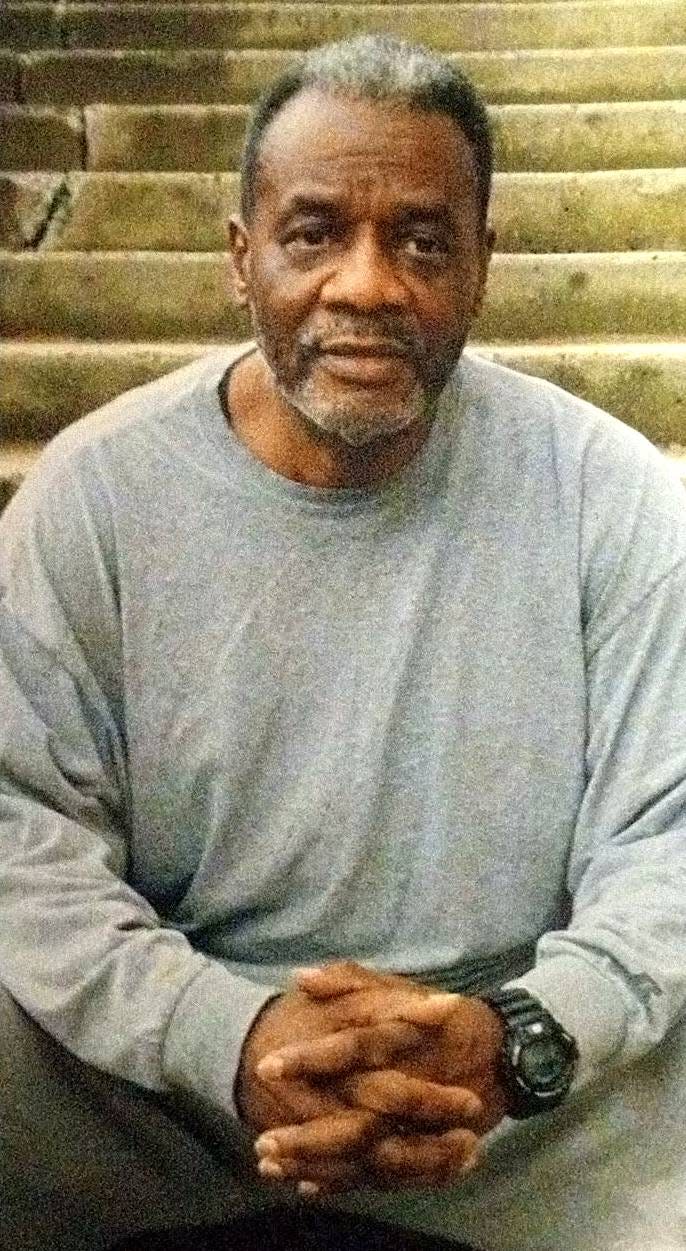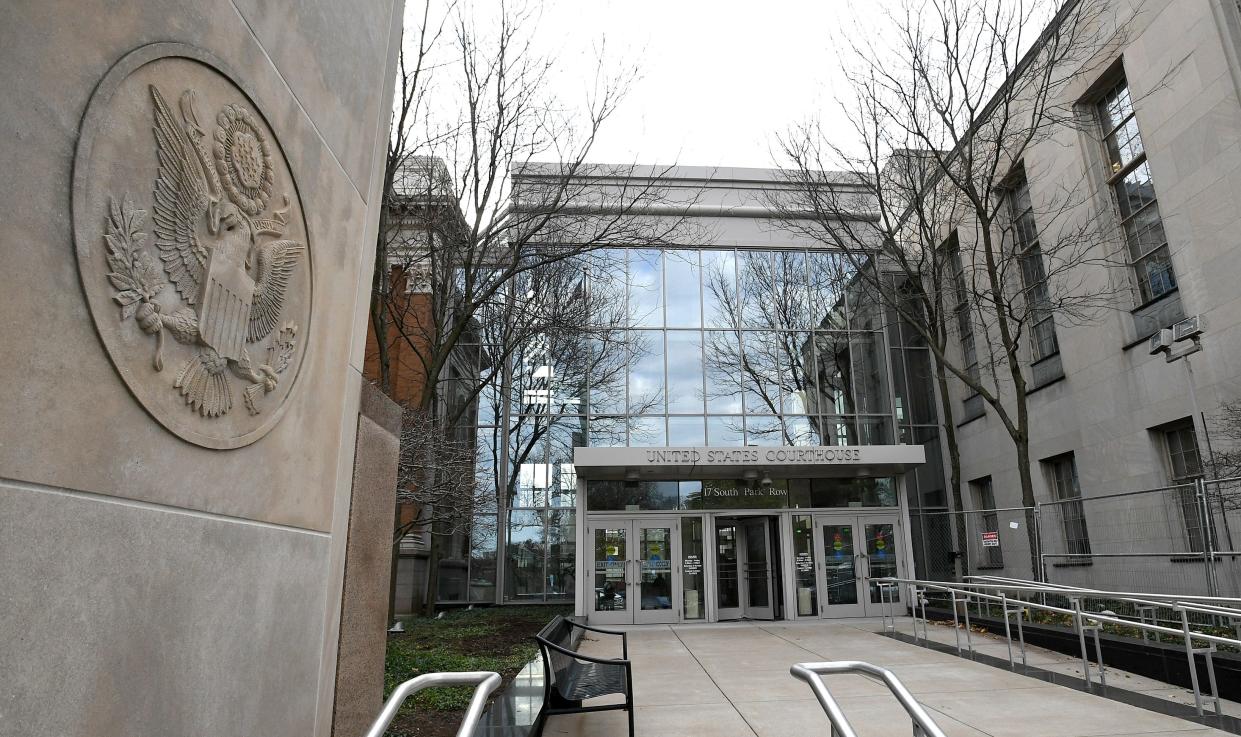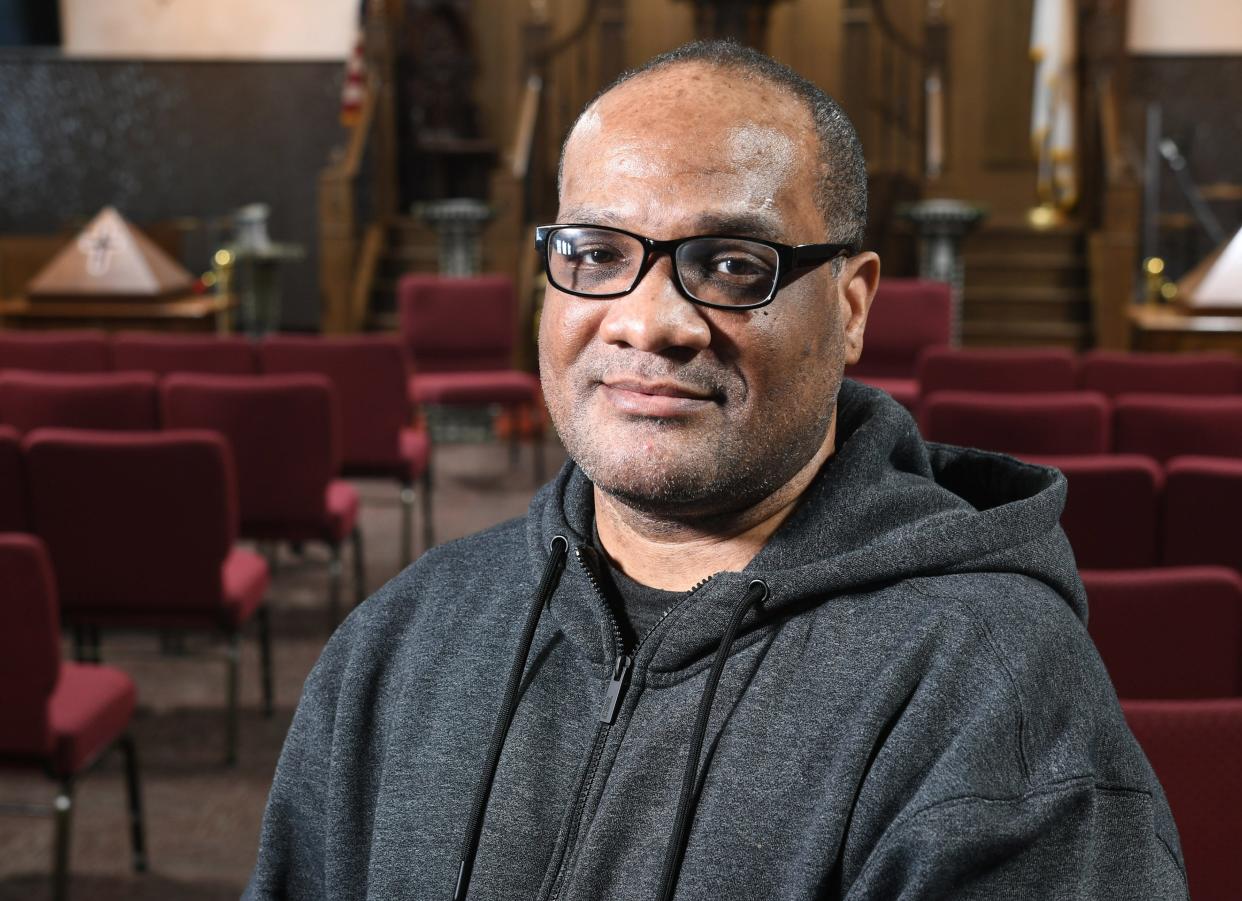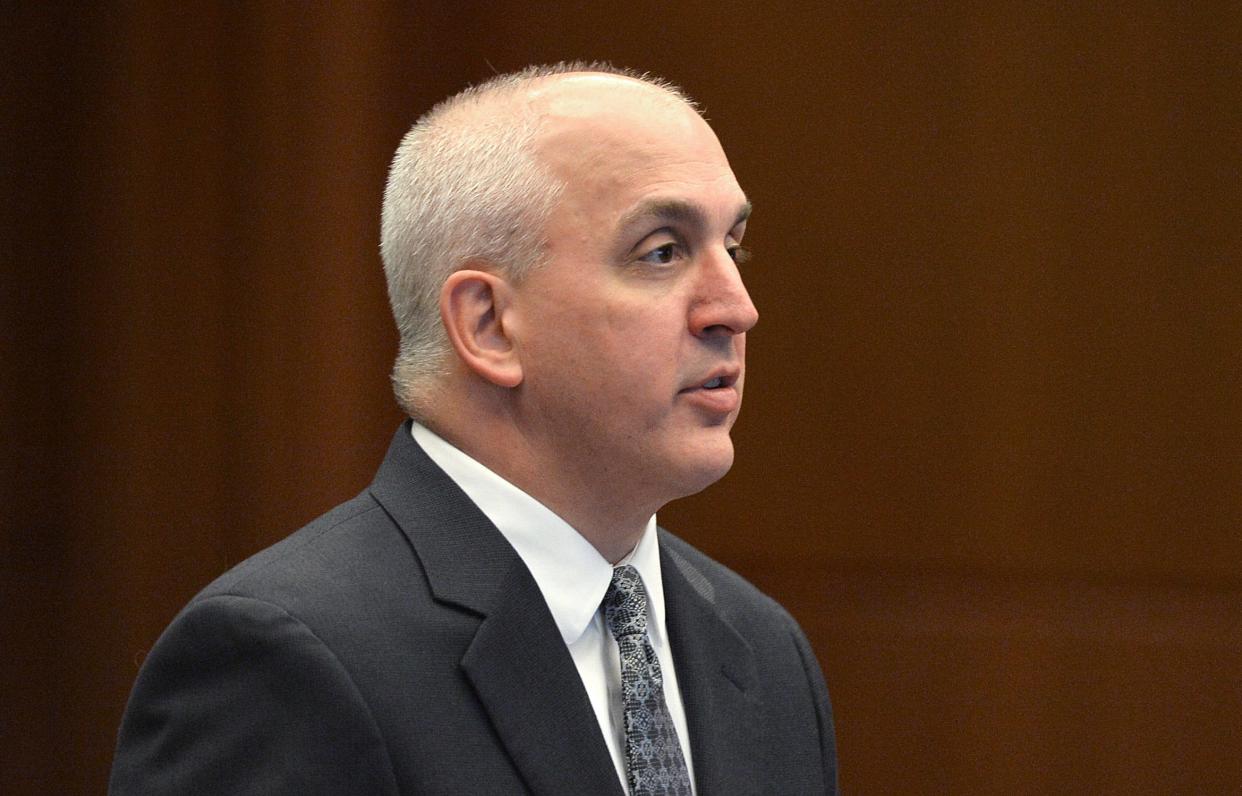Erie 'drug kingpin' pleads with judge to end 7-year wait and rule on cutting life sentence
The two convicted Erie drug kingpins are linked in infamy and in hope. They remain the only drug defendants ever sentenced to life terms in U.S. District Court in Erie — though those sentences can be reduced.
Their quests for relief have turned out differently despite their similar circumstances.
One of the two defendants, Carl Anthony Knight, was sentenced to life in 1999 but released from prison in January 2021 after serving about 22 years in the drug case.
Knight, now 52, won a reprieve under the First Step Act, the 2018 federal law that allows federal judges to reduce sentences of some defendants convicted of offenses related to crack cocaine.
Knight's release was an encouraging development to the other drug kingpin sentenced to life in federal court in Erie. He is John Cooley, who was sentenced in 2004 but also applied for a sentencing reduction under the First Step Act.
Cooley, now 67, filed his petition for early release under the First Step Act in June 2019 — three months before Knight filed his request.

Cooley and Knight's requests went before the same judge, Senior U.S. District Judge David S. Cercone, based in Pittsburgh.
But Cooley is still waiting for Cercone to rule on his request under the First Step Act.
He is also waiting for Cercone to rule on another petition for a sentence reduction that one of his lawyers filed in March 2016, citing changes in federal sentencing rules that preceded the First Step Act. Cooley sought early release after he contracted COVID-19 in 2021, but Cercone has never ruled on that request, either, according to court records.
All told, Cooley and his family have spent more than seven years to see if Cercone will reduce Cooley's life sentence and let him out of prison early, just as the judge did in Knight's case. John Cooley wants Cercone to give him time served, release him from prison and order him to serve four years of supervised release.
"We have been waiting," said Cooley's brother Garry Cooley.
In new filing, John Cooley appeals directly to judge
The Federal Public Defender's Office in Pittsburgh is representing Cooley and has advocated for his release in light of the changes in federal law — changes that the U.S. Sentencing Commission and Congress approved to address the racial disparities that had plagued federal drug sentencings, especially for crack, during the war on drugs in the 1980s.
When Knight and Cooley were sentenced, the length of the federal sentences for crack offenses were much higher than those for offenses related to powder cocaine, with a larger percentage of Black defendants sentenced for crack offenses. Both Cooley and Knight are Black.
Under the First Step Act, between 2019 and early 2023, 29,944 people had been released from federal prison ahead of their original release dates, according to an April 2023 U.S. Department of Justice report and the Sentencing Project, a Washington, D.C.-based nonprofit that advocates for sentencing reform.
Cooley has grown frustrated that he is not among the nearly 30,000 now-former inmates who have benefited from the First Step Act.
He has become so tired of waiting on a ruling in his case that he is filing his own court papers as he remains incarcerated at the medium-security Federal Correctional Institution at Hazelton, in northeastern West Virginia.

On Dec. 22, Cooley — representing himself though an assistant federal public defender is still his lawyer — filed a motion pleading with Cercone to act.
Cooley, according to his one-page motion, "seeks a status conference to move the seven year long proceedings to a final judicial determination."
Cooley's frustration is understandable, Garry Cooley said. He said his brother has already served 21 years in prison, which includes the time he was incarcerated as he awaited trial following his indictment in December 2002.
His brother has reformed himself while in prison, Garry Cooley said. He said his brother deserves a chance to be reunited with his four children, 12 grandchildren, six siblings and his 86-year-old mother.
"I am just wondering if the judge can see fit to take 10 minutes out of his day to look at this case," Garry Cooley, 62, who lives in Norfolk, Virginia, said in a telephone interview. "And if he looks at this case, he will see fit to see that John should be home."
'Have mercy on me,' Cooley writes in letter over sentence
John Cooley asked for relief in a letter he sent to Cercone on April 6. Cooley wrote that he wants to be with his family and has learned from his mistakes.
"I come before you in this letter and ask will you please forgive me and have mercy upon me," according to the letter, filed as part of the court record.
Cooley in the letter asked that Cercone "grant me another chance at life to help and spend time with my family and be a pillar in my community by letting the young fathers and mothers know there is a better way than drugs and a life of crime."
Cercone had not filed a response to Cooley's request for a status conference as of Wednesday. Cercone's chambers did not immediately respond to a request for comment from the Erie Times-News on when the judge might rule on the requests for a reduction of sentence.
Though his chambers are in Pittsburgh, Cercone hears some cases in U.S. District Court in Erie, a division of the Pittsburgh-based U.S. District Court for the Western District of Pennsylvania. Cercone was appointed a federal judge in 2002, and he assumed senior status in 2017.
As a senior federal judge, Cercone, 71, is handling a reduced caseload but is not retired. Federal law sets no retirement age for U.S. District Court judges, federal appeals court judges and U.S. Supreme Court justices.
'He was a drug kingpin,' judge says at Cooley's sentencing
Cooley was convicted at trial in 2003 of one count of conspiracy to traffic in more than 50 grams of crack. After hearing evidence over seven days, the jury convicted him in less than an hour.
The U.S. Attorney's Office prosecuted Cooley under a federal statute that carries a maximum sentence of life if the defendant is found guilty of operating a large-scale drug-trafficking operation.
Authorities said Cooley's was one of the largest crack cocaine conspiracies ever prosecuted in northwestern Pennsylvania.
The government used evidence gathered by an FBI-led task force to allege Cooley trafficked in at least 20 kilograms of crack — or 44 pounds — from January 1992 to December 2002, according to court records.
Investigators seized no drugs or money from Cooley and made no undercover buys. Investigators and the U.S. Attorney's Office largely used testimony from Cooley's former suppliers and dealers to convict him.
The prosecutor on the case, Assistant U.S. Attorney Christian Trabold, successfully argued to the jury that investigators must use those in the drug trade to build a drug case.
"You don't find swans in the sewer," Trabold said at trial at the federal courthouse in Erie.
U.S. District Judge Sean J. McLaughlin presided at Cooley's trial and sentenced him to serve the rest of his life in federal prison. The federal system has no parole.
McLaughlin said at sentencing that Cooley had reached the last stretch on the "dead-end road of his life." McLaughlin urged a group of young people who had shown up in court to support Cooley to "choose a better path."
"Stay away from the Cooleys of the world," McLaughlin said. "He was a drug kingpin. Now he's the king of nothing."
McLaughlin, who resigned as a judge in 2013, said that a life sentence was warranted to protect the community.
"I am convinced that if Mr. Cooley were released from jail," McLaughlin said at the sentencing, "he would quickly resume his criminal activities."
Cooley was 47 years old.
How Cooley's case is similar to Carl Knight's
The sentence made Cooley only the second person, after Carl Knight, to get sentenced in U.S. District Court to life in prison for drug trafficking. Knight was convicted at trial in 1999 of trafficking in more than 208 kilograms of crack — or 458 pounds — from 1993 to 1997, making Knight the head of the largest crack ring known to operate in northwestern Pennsylvania.
Senior U.S. District Judge Maurice B. Cohill Jr. sentenced Knight to life in August 1999. Cohill, who died in 2022, told Knight that his drug-trafficking network "literally saturated the streets of Erie" with crack.
Knight was 28 years old.
In making his case for early release under the First Step Act, Knight emphasized what he had done in prison to rehabilitate himself. His achievements included completing "no fewer than 45 educational and vocational classes," according to Cercone's ruling that granted Knight early release.

Knight also had the support of Erie County Judge John J. Trucilla, who prosecuted Knight as an assistant U.S. attorney.
In a letter he wrote on Knight's behalf in 2019, Trucilla argued that Knight's life sentence should be reduced because the key co-defendant in the case, Victor Calderon-Rodriguez, who pleaded guilty and cooperated, got eight years in federal prison. Trucilla also wrote that Knight rejected a plea deal that would have led to a sentence of 15 years.
Cercone cited Trucilla's letter in granting Knight early release under the First Step Act. Cercone reduced Knight's sentence to 261 months — or 21 years and nine months — and gave him time served, which led to his release from prison. Cercone also gave Knight five years of supervised release.
"Although defendant's drug-trafficking offense truly was the result of a major drug-trafficking operation," Cercone wrote in a 23-page opinion in Knight's case on Jan. 27, 2021, "a sentence of 261 months adequately reflects the seriousness of the offense, promotes respect for the law and provides just punishment."
U.S. Attorney's Office is fighting Cooley's request for relief
The U.S. Attorney's Office opposed Knight's request under the First Step Act. The office is also against Cooley's request for relief.
"Cooley's life sentence remains appropriate," an assistant U.S. attorney in Pittsburgh, Adam Hallowell, said in a motion he filed in July 2019 in response to Cooley's petition for a reduced sentence under the First Step Act.
"For over ten years, he was the kingpin of a major distribution ring in the Erie area," according to the motion. "As trial testimony established, Cooley sold a particularly potent form of crack and utilized multiple sellers. Cooley also obstructed police investigations into his conduct and intimidated potential witnesses against him."

Hallowell referred to Judge McLaughlin's statement, at sentencing, that Cooley "would quickly resume his criminal activities" if released from prison.
Cooley and his family are living under 'uncertainty'
Cooley is hoping Cercone rejects the arguments of the U.S. Attorney's Office, just as he rejected them in the case of Carl Knight.
In his motions, Cooley and his lawyers cited the progress he has made in prison, including getting degrees in the study of the Bible and getting ordained as a pastor with an organization called Transfiguration Ministries Worldwide. His declining his health, including blood clots, should also be considered a factor under the First Step Act, according to the motions.
Cooley's lawyer, Samantha Stern, an assistant federal public defender, referred to Cooley's health and his work in prison in the most recent document she filed in his case, a brief docketed in July 2022. Stern also cited a letter from a prison counselor, who wrote that Cooley "has been nothing short of a model inmate" as well as "a good and caring person."
Stern in the brief requested that Cercone act on the pending motions in Cooley's case, including the motion for relief under the First Step Act "without further delay." Stern offered to make arguments at a hearing "if it will assist this Court in reaching a decision as to whether to reduce Mr. Cooley's sentence."
"As Mr. Cooley continues to await resolution of his pending motions," Stern said in the brief, "he and his family live under uncertainty as to whether he will receive any relief from his life sentence."
Cercone never filed a response to Stern's brief.
A year and five months later after Stern filed his brief, and more than seven years after he first went to court for relief, Cooley filed his own request for a status conference. He and his family continue to hope a ruling will come soon.
"They are overlooking his case," Garry Cooley said of his brother. "They are overlooking him."
Contact Ed Palattella at epalattella@timesnews.com. Follow him on X @ETNpalattella.
This article originally appeared on Erie Times-News: Erie 'drug kingpin,' tired of long wait, pushes judge to cut life term
